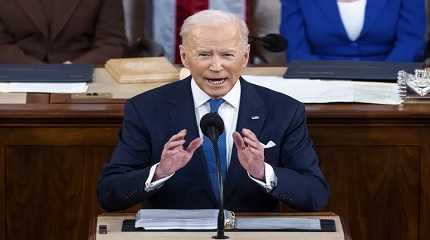
WASHINGTON, March 30 (NNN-AGENCIES) — President Joe Biden promised nearly $700 million to support a global “turning point” toward democracy, painting a portrait of progress at a summit despite the growing assertiveness of China and Russia and concern elsewhere over backsliding.
Biden invited 121 leaders for his second, largely virtual “Summit for Democracy,” where he also announced an alliance by like-minded countries on rules for surveillance technology — seen as a growing tool by China as its technology advances.
Biden hailed a “turning point for our world toward greater freedom, greater dignity and greater democracy.”
“I believe this is the defining challenge of our age and, today, we can say with pride that the democracies of the world are getting stronger, not weaker,” Biden said.
“Autocracies of the world are getting weaker, not stronger,” Biden said.
His optimism stands in contrast to the latest annual report from the Swedish-based V-Dem Institute, which found that global advances in democracy over the past 35 years had been wiped out.
Freedom House, the US-backed research group, said that democracy deteriorated last year, although it also saw a growing number of bright spots.
Addressing the summit, UN Secretary-General Antonio Guterres warned that the world was undergoing a “dramatic upheaval” in which democratic values are “under assault,” pointing to rising attacks and restrictions on media and human rights defenders.
“Today, we see more and more despotism and less and less enlightenment,” Guterres said.
Biden nonetheless pointed to progress including efforts by Angola to build an independent judiciary, anti-corruption plans by the Dominican Republic and Croatia and, at home, US voters’ rejection of Donald Trump-backed deniers of
the 2020 election results.
Saying it was crucial to “keep the momentum going,” Biden announced $690 million to promote democracy overseas.
The funding followed a commitment of $424 million offered at the first summit in 2021. The new funding will back programs to stage free elections, advance independent media and strengthen action against corruption.
After criticism that the first summit was too US-focused, with Biden seeking to turn the page from Trump’s norm-shattering presidency, Biden tapped leaders on each continent — from South Korea, Zambia, Costa Rica and the
Netherlands — as co-hosts.
“We must embark on a new journey to revive democracy, which is currently under attack,” said South Korean President Yoon Suk Yeol, who announced his country would spearhead the third Summit of Democracies.
The United States also gave prominent roles at the summit to Taiwan, a self-governing democracy claimed by China and not recognized by Washington, and Ukraine, which is defending against a Russian invasion.
Ukrainian President Volodymyr Zelensky told the summit that his country was the frontline against a threat to all democracies from Russia.
Biden declined to invite a number of leaders over concern on their records including Turkish Recep Tayyip Erdogan, who faces reelection in May after two decades in power, and, alone among European Union members, Hungarian Prime Minister Viktor Orban, an outspoken critic of liberal values.
Close US partners who failed to make the cut include Bangladesh, Singapore and Thailand.




